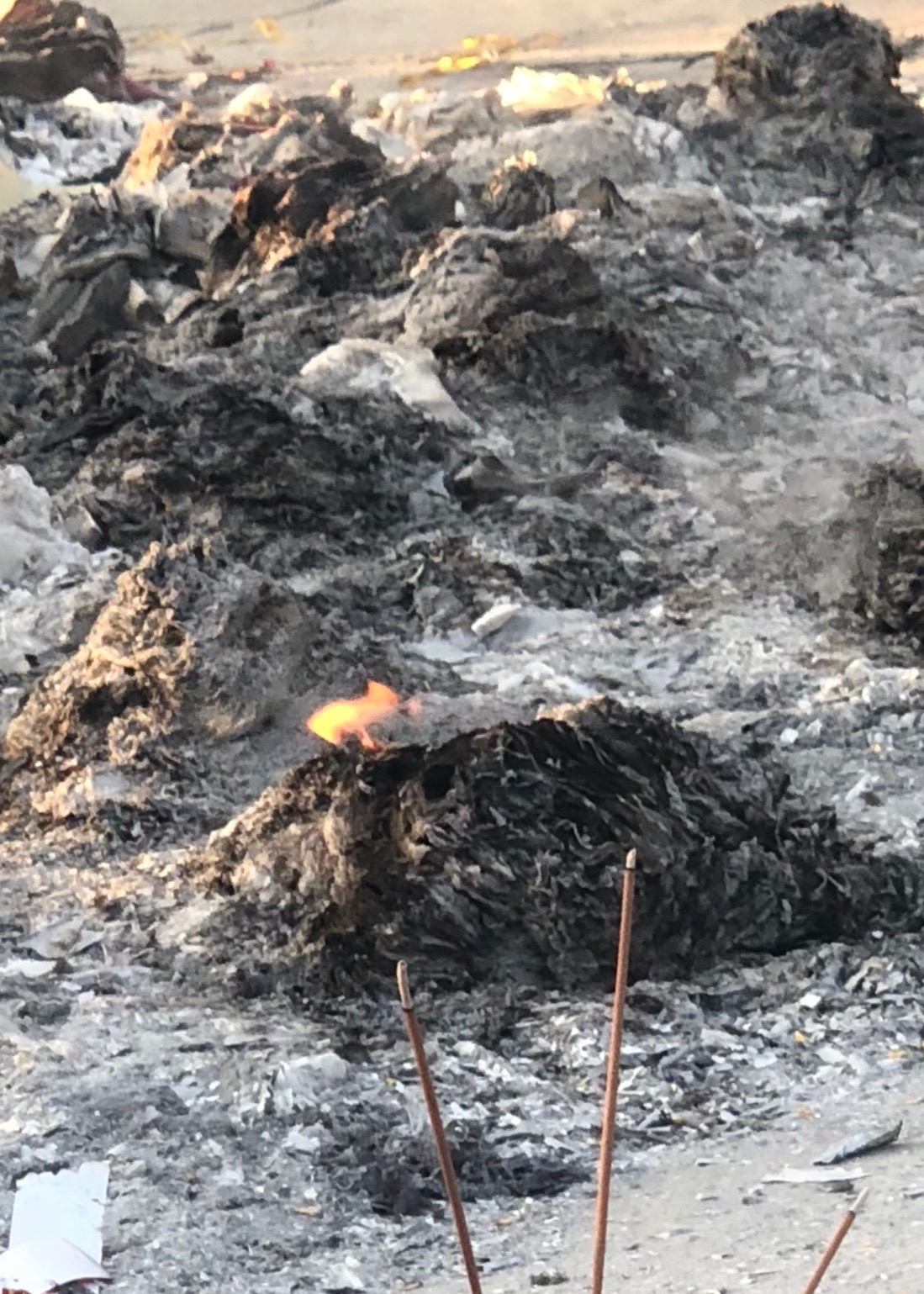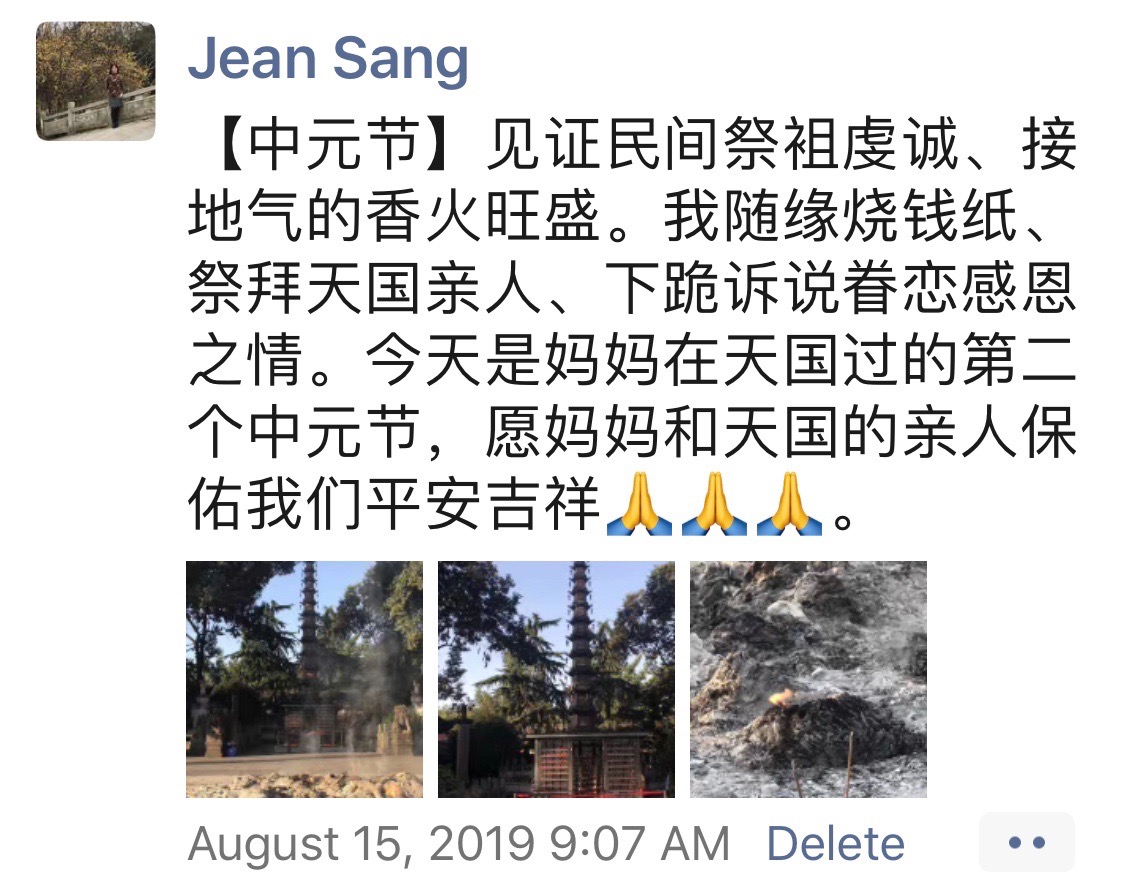Chinese Version
2020-08-30
July 15 of the Lunar calendar is also known as “Half July”, “Zhong Yue Jie” in Taoism, “Yulan Festival” in Buddhism, which also commonly known as “Hungry Ghost Festival”, “Shi Gu”, “dead people’s Day”. This day is a trinity of festivals for Buddhism, Taoism and secular Chinese culture. There is a well-known saying: “There is no boundary between life and death” on this day and our dead ancestors may come back to observe the living on this day.
Half July, Chinese New Year’s Eve, Qingming Festival and Double Ninth Festival are the four major Chinese traditional festivals for the worship of ancestors.
On August 15, 2019 which was also July 15 of the Lunar calendar, I was alone in Chengdu waiting for my high school reunion to be started on the next day. In the afternoon, while wandering around for street food near the hotel, I accidentally walked into Temple Wenshu, a famous Buddhist temple. I saw many people, old and young, burning paper money and incense sticks, kowtowing and bowing in the courtyard of Temple Wenshu, which was already piled with lots of ashes. An old man with incense sticks on his hands told me, “Today is the Zhongyuan Jie, a day to worship our ancestors.” What I heard and saw in the courtyard confirmed that Half July is really a trinity of festivals for Buddhism, Taoism and secular Chinese culture.
After witnessing the whole-hearted folk worship of ancestors in surprise, I also burned paper money and incense sticks, and knelt and kowtowed to pray for peace. In the land of my home province, after a long separation, I closed my eyes and thought of my ancestors. Under the rich ceremony atmosphere, I remember the remote full of love ceremony given to me by my mother and my nanny in the mid-1990s.
In the mid-1990s, while my parents and my nanny Yeyi were in my hometown Zigong, I did my PhD research at VSL in the department of physics at the Catholic University of America (CUA) in Washington, D.C. In that time, e-mail did not exist and my parents and I exchanged greetings and family affairs through overseas letters every month. After my daughter was born, my mother wrote to me in a letter: “Today, your Yeyi (my nanny) visited us and asked for the childhood clothes of you and your bother. Your Yeyi was going to Mountain Emei soon. She planned to hang the clothes on the JinDing (the top of Mountain Emei) for the Buddha’s blessing for a peaceful life for you and your brother.” My mother’s detailed and emotional description of my Yeyi’s love ritual for us touched me very much and I will remember this love forever.
“There is no boundary between life and death in Half July”. My love reverberated between heaven and earth, spreading sweetness and eternity, and enriching my soul. I suddenly realized that one of the driving forces for the continuation and spread of ancient customs is love and family affection.
Little Episodes
1. August 15, 2019. I burned paper money and incense sticks, knelt and kowtowed in the courtyard of Temple Wenshu, worshipped my ancestors and prayed for peace.

2. My shared moment: While witnessing the rich and deep rooted folk ancestor worshipping ceremony, I also burnt paper money, worshiped my ancestors, knelt down and expressed my feelings of thankful and gratitude. Today is my mother’s second Zhongyuan Jie in heaven. May my late mother and ancestors bless us with safety and auspice(2019-08-15-2019).



